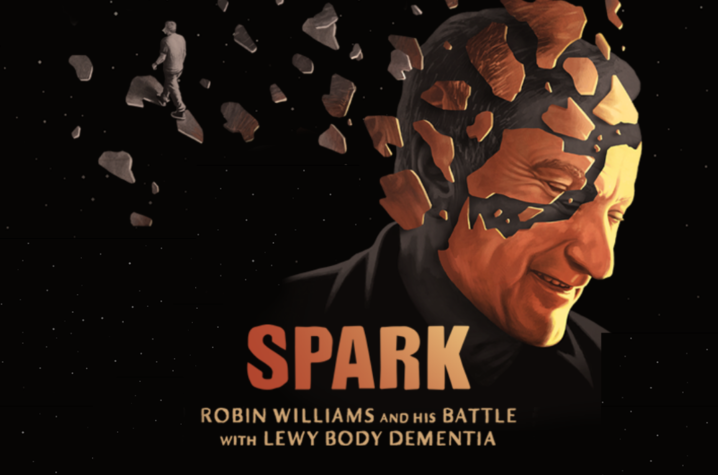Comedian Robin Williams' Struggle with Undiagnosed Dementia is Focus of Documentary

The University of Kentucky Public Relations & Strategic Communications Office provides a weekly health column available for use and reprint by news media. This week's column is by Dr. Greg Jicha and Sally Scherer from the University of Kentucky’s Sanders-Brown Center on Aging.
LEXINGTON, Ky. (March 29, 2021) — Chances are, comedian Robin Williams has made you laugh.
Perhaps you’ve seen his stand-up routine or watched his hilarious physical humor in the 1978 TV sitcom “Mork & Mindy.” Maybe you saw his heartwarming acting skills in movies such as “Mrs. Doubtfire,” or heard him as the voice of the fun-loving genie in Disney’s “Aladdin.”
Williams was called a “bold” comedian with a “kind and gentle spirit” before his death in 2014. He was 63 years old.
Now, a movie reveals the true story about his death. A 45-minute documentary “SPARK: Robin Williams and his Battle with Lewy Body Dementia (LBD),” tracks the final years of his life and his battle with undiagnosed Lewy Body Dementia.
Susan Schneider Williams, the widow of the late comic, has called LBD, “the terrorist inside my husband’s mind.”
A progressive dementia, LBD is the second most common form of progressive dementia after Alzheimer’s. The disease occurs when excess deposits of the protein alpha-synuclein, known as Lewy bodies, clump up inside neurons, causing damage to certain parts of the brain, and, as a result, a decline in cognition and movement.
LBD is an umbrella term for two related diagnoses: Dementia with Lewy bodies (DLB) and Parkinson’s disease dementia. The early warning signs of both forms are important: DLB takes place when people develop cognitive issues, including memory loss, while those with Parkinson’s disease dementia initially develop movement issues such as muscle stiffness, gait and tremors.
Over time, the symptoms become more and more similar. Other LBD symptoms include depression, anxiety, sleep disorder, insomnia and hallucinations.
LBD afflicts about 1.5 million Americans, but it is often misdiagnosed as Alzheimer’s disease or Parkinson’s.
Thanks to the support from Acadia Pharmaceuticals Inc., and the Lewy Body Dementia Association, the University of Kentucky Sanders-Brown Center on Aging is hosting a free virtual showing of “SPARK” from 6-8 p.m., Thursday, April 8. After the film showing, a discussion will take place featuring guest panelists from the University of Kentucky, the Mayo Clinic and the Cleveland Clinic.
Please join us in discovering more about his debilitating disease and how this affected Robin Williams’ life by registering at https://tinyurl.com/SBCoASPARK
If you or someone you know are having suicidal thoughts, help is available. The National Suicide Prevention Lifeline is available 24 hours a day at 800-273-8255.
As the state’s flagship, land-grant institution, the University of Kentucky exists to advance the Commonwealth. We do that by preparing the next generation of leaders — placing students at the heart of everything we do — and transforming the lives of Kentuckians through education, research and creative work, service and health care. We pride ourselves on being a catalyst for breakthroughs and a force for healing, a place where ingenuity unfolds. It's all made possible by our people — visionaries, disruptors and pioneers — who make up 200 academic programs, a $476.5 million research and development enterprise and a world-class medical center, all on one campus.




